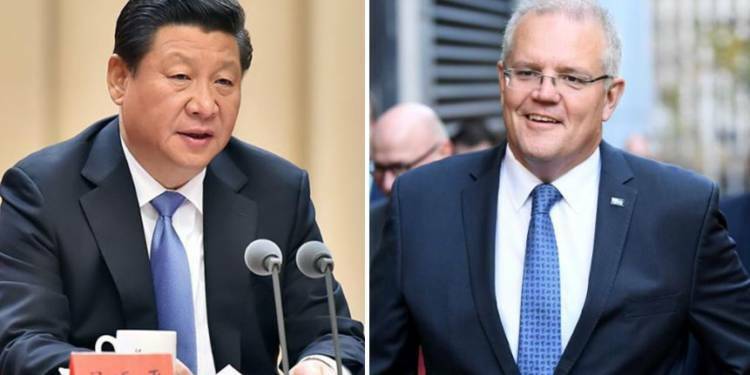Papua New Guinea was on the verge of a catastrophe. The Xi Jinping government had offered New Guinea its vaccines, but despite the critical condition of the tiny island state, they were yet to be approved. But under Prime Minister Scott Morrison, Australia’s vaccine outreach and diplomacy program gave respite to the island and dealt a major blow to China’s ambitions in the Pacific.
Papua New Guinea seemed to have missed the worst of the coronavirus outbreak for a long time. However, the remote Pacific island’s largest hospital has been on the verge of collapsing due to a surge in cases since February. The epidemic is seen as a significant concern as well as a crucial moment in a wider “vaccine diplomacy” effort by Australia, the country’s far larger neighbour.
The Morrison government has stated that it would assist Papua New Guinea in containing the outbreak. It has sent nearly 8,500 vaccine doses to its former colony to immunise frontline staff and is considering sending more once local production of the AstraZeneca vaccine ramps up.
The Covid vaccine is being rolled out in Papua New Guinea, with the first doses of AstraZeneca shots supplied by Australia being sent to health staff, senior statesmen, and elected officials, including Prime Minister James Marape.
Prime Minister Marape said, “I have decided to be the first to be vaccinated because of the contradicting views in the country on vaccination, with half the country going against it.”
He added. “I came here to be vaccinated to show Papua New Guineans that it’s safe.”
On Tuesday, Marape was joined by health minister Dr Osborne Liko, and Prof John Vince from the UPNG school of medicine and science, both of whom were vaccinated. The first 50 people to be vaccinated included senior statesman Dadi Toka Snr, Sir Moi Ave, and PNG’s Olympic weightlifting gold medalist Dika Toua. According to Marape, the government is considering all ways to make Covid vaccines “optionally viable.”
These initiatives are just a small part of Australia’s Pacific vaccine diplomacy. As a member of the Quad, which includes the United States, India, and Japan, Australia has pledged AU$100 million ($76 million) to assist in the distribution of one billion vaccines to Asian and Pacific Island countries by the end of 2022. This comes on top of Australia’s AU$523 million Pacific and Southeast Asia Regional Vaccine Access and Health Security Initiative.
Even after the crisis on its doorstep is subdued and the pandemic subsides, some experts predict that Australia will play a key role in assisting the Pacific region in restoring economic damage and moving forward. It is competing for dominance with China, which announced in January that it will supply vaccines to Pacific countries as well.
Former Prime Minister Malcolm Turnbull announced the “Pacific Step-up” plan of the Morrison government in 2016. The policy aims to increase regional engagement and fight Beijing’s increasing influence.
The Australian Infrastructure Financing Facility for the Pacific is at the centre of this “step-up,” with AU$1.5 billion in loans and AU$500 million in grants to finance infrastructure. It has already backed three big ventures, including a solar farm in Papua New Guinea, a hydropower system in the Solomon Islands, and an undersea cable in Palau, since it began operations in 2019.
Many investors are reluctant to finance projects in small, distant economies. China does not seem to be concerned about these issues. Jonathan Pryke, the Director of Lowy Institute’s Pacific Islands Program, said, “However, the fact is that these [China-backed] ventures have now been completed, and it has turned out that they are overpriced and of variable quality”.
He added, “I believe Pacific governments have become much more astute because due to their restricted access to debt, they can only take so many bites at these ventures.”
This is certainly not the first time that Australia has gained a major advantage in the Pacific at the expense of China, nor the first time Papua New Guinea, backed by Australia, has thwarted Chinese ambitions.
The Maritime element of the Papua New Guinea (PNG) Defence Force intercepted what was identified as a suspected Chinese vessel back in August last year. The unregistered vessel was illegally operating in PNG waters between Kavieng and Manus Island, where the US and Australia were constructing the joint Lombrum Naval Base to counter China’s interference in the Pacific.
Papua New Guinea has always stood up to China’s aggression, as just a few days before detaining the Chinese ship, there was a major controversy after the China Metallurgical Group Corporation (MCC), which controls a major nickel mine in Papua New Guinea, said that 48 staffers who returned from China earlier this month may test positive for COVID-19 because they hadn’t been vaccinated.
Until then, no COVID-19 vaccine had been identified, and it was clear that Beijing was using the Pacific island nation as a laboratory for live testing of its substandard vaccines. Papua New Guinea had managed to hold the Chinese virus at bay until then, so the vaccine debate was a big provocation.
There had been many major contentious issues before, one of the major ones was PNG’s refusal to pay back the loans secured from China to build the national data centre but it was later revealed to have major security flaws.
Papua New Guinea’s geographic location makes it a strategic backyard for Canberra in a number of ways. For starters, it is close to Australia in Oceania, which is Canberra’s natural maritime sphere of influence. Secondly, Australia and the United States are working together to construct the Lombrum naval base on PNG’s Manus Island, which will boost maritime capabilities in the Western Pacific in order to contain China.
Morrison is attempting to orchestrate an irreconcilable divide between Beijing and Port Moresby because Australia cannot afford to lose PNG. As a result, Morrison seems to be thriving so far as Papua New Guinea, a tiny Pacific island nation, confronts China.
